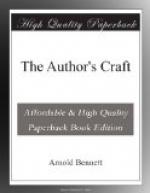The truth is that an artist who demands appreciation from the public on his own terms, and on none but his own terms, is either a god or a conceited and impractical fool. And he is somewhat more likely to be the latter than the former. He wants too much. There are two sides to every bargain, including the artistic. The most fertile and the most powerful artists are the readiest to recognise this, because their sense of proportion, which is the sense of order, is well developed. The lack of the sense of proportion is the mark of the petit maitre. The sagacious artist, while respecting himself, will respect the idiosyncrasies of his public. To do both simultaneously is quite possible. In particular, the sagacious artist will respect basic national prejudices. For example, no first-class English novelist or dramatist would dream of allowing to his pen the freedom in treating sexual phenomena which Continental writers enjoy as a matter of course. The British public is admittedly wrong on this important point—hypocritical, illogical and absurd. But what would you? You cannot defy it; you literally cannot. If you tried, you would not even get as far as print, to say nothing of library counters. You can only get round it by ingenuity and guile. You can only go a very little further than is quite safe. You can only do one man’s modest share in the education of the public.
In Valery Larbaud’s latest novel, A.O. Barnabooth, occurs a phrase of deep wisdom about women: “La femme est une grande realite, comme la guerre.” It might be applied to the public. The public is a great actuality, like war. If you are a creative and creating artist, you cannot ignore it, though it can ignore you. There it is! You can do something with it, but not much. And what you do not do with it, it must do with you, if there is to be the contact which is essential to the artistic function. This contact may be closened and completed by the artist’s cleverness—the mere cleverness of adaptability which most first-class artists have exhibited. You can wear the fashions of the day. You can tickle the ingenuous beast’s ear in order to distract his attention while you stab him in the chest. You can cajole money out of him by one kind of work in order to gain leisure in which to force him to accept later on something that he would prefer to refuse. You can use a thousand devices on the excellent simpleton....




